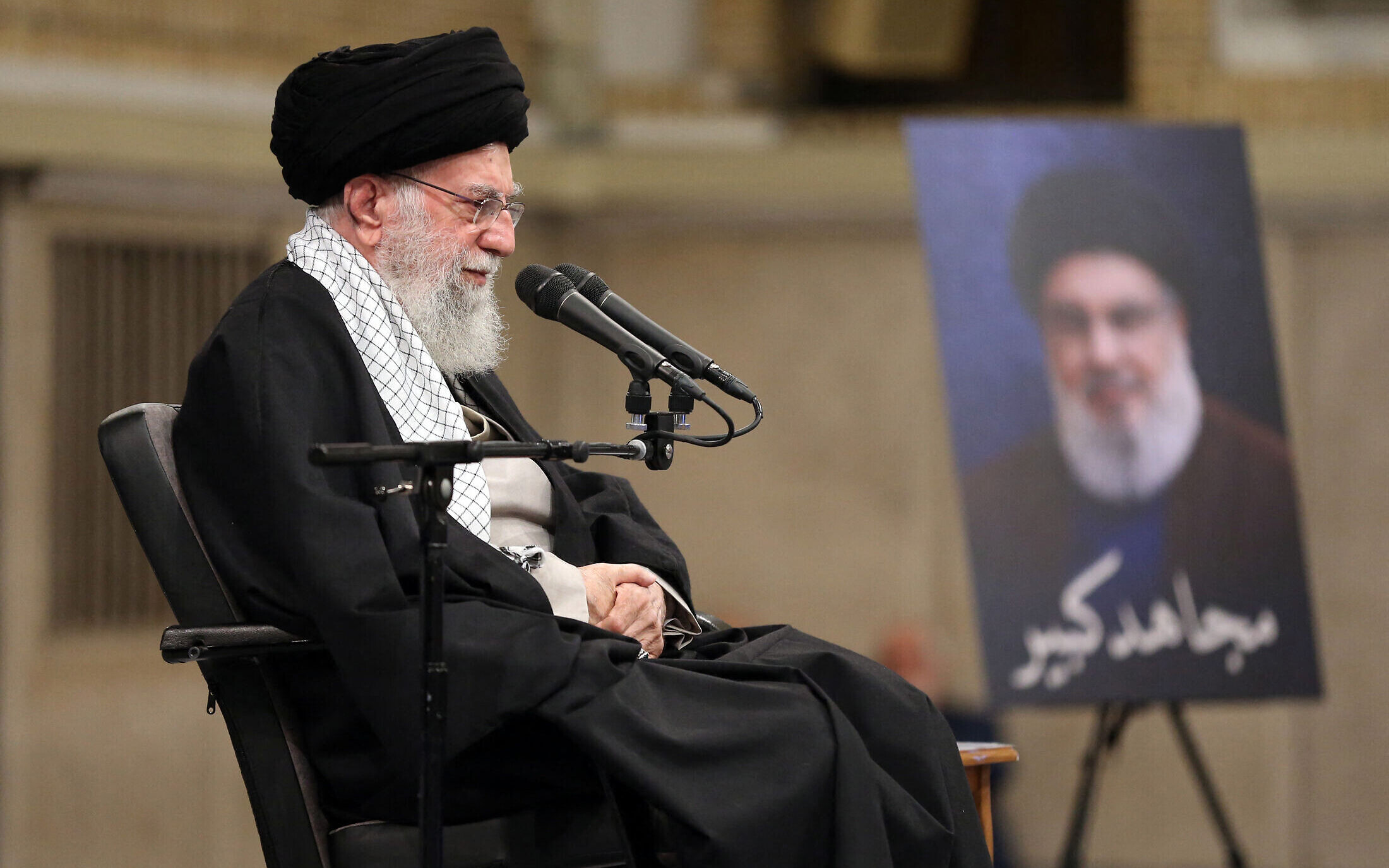
Iran’s Resolve”: Khamenei Proclaims Support for Palestinians and Lebanese
In a rare and highly charged Friday sermon, Iran’s Supreme Leader, Ayatollah Ali Khamenei, boldly declared that Israel “won’t last long,” expressing unequivocal support for the Palestinian and Lebanese resistance movements against the Israeli state. Addressing a massive crowd of tens of thousands at a mosque in Tehran, Khamenei characterized Iran’s recent missile strikes on Israel as a form of “public service,” positioning them as acts of solidarity with those oppressed by Israel.
Khamenei delivered his sermon while keeping a gun prominently by his side, a gesture that underscored the seriousness of his message. He insisted that Israel would ultimately fail in its confrontations with Hamas and Hezbollah, reinforcing his stance as chants of solidarity and support erupted from the gathered crowd. This sermon marked Khamenei’s first public address on a Friday in five years, serving as a significant display of defiance in the face of escalating threats to his life, particularly from Israel, which has openly promised retaliation for recent attacks.
In his address, Khamenei paid tribute to Hassan Nasrallah, the recently deceased leader of Hezbollah, who was killed in an Israeli airstrike. He stated, “Sayyed Hassan Nasrallah may be gone, but his spirit and legacy will continue to inspire us. His martyrdom will only amplify our resolve. We must resist the enemy while fortifying our unwavering faith.” Khamenei’s words highlighted the emotional weight of Nasrallah’s death, portraying him as a symbol of resistance whose influence would persist among supporters.
Khamenei referred to Hezbollah as a “blessed tree” that thrived under Nasrallah’s leadership, emphasizing the group’s importance in the broader struggle against Israel. His praise for Hezbollah was accompanied by a call to action for Muslims worldwide, urging them to support the “bloodied people of Lebanon” and stand united in defense of al-Aqsa mosque, a site of profound religious significance.
The Iranian leader lauded Hamas’s recent attacks on Israel as a “correct move,” asserting that no international law could justly condemn the Lebanese and Palestinians for defending themselves against what he described as occupation. This narrative aligns with Iran’s longstanding support for both Hamas and Hezbollah, framing their actions as legitimate resistance against imperialism and oppression.
Khamenei’s rhetoric did not shy away from confrontational language. He labeled Israel as a “tool” of the United States, designed to exert control over regional resources and dominate the Middle East. In a sweeping statement, he declared, “The Zionist entity will be uprooted; it has no legitimate roots and exists solely due to American backing.” This assertion reflects a long-held view in Iran that the existence of Israel is inextricably linked to U.S. foreign policy and military support.
The timing of Khamenei’s sermon is significant. It came just three days after Iran launched a substantial missile attack, targeting crucial infrastructure within Israel with 180 missiles. This aggressive action underscores Iran’s commitment to supporting its allies in the region and its willingness to escalate military confrontation with Israel. Additionally, the sermon coincided with the impending first anniversary of the Israel-Gaza war, further amplifying the emotional and political stakes of Khamenei’s message.
This event also marks a notable moment in Khamenei’s leadership, as it is his first Friday sermon since January 2020, when he addressed the nation following a missile attack on a U.S. army base in Iraq. That attack was part of Iran’s retaliation for the assassination of top Revolutionary Guards commander Qasem Soleimani, signaling the high-stakes nature of Khamenei’s political and military calculus.
Khamenei’s message was not merely a rallying cry for his domestic audience but also a signal to regional allies and adversaries alike. By asserting that Israel’s existence is contingent upon U.S. support, he aimed to foster a sense of unity among resistance groups while simultaneously projecting strength to deter perceived threats.
In a region marked by deep-seated tensions and historical grievances, Khamenei’s rhetoric reflects a broader ideological struggle. His framing of the conflict as a battle between the oppressed and their oppressors resonates deeply within the Islamic Republic’s political narrative, positioning Iran as a champion of anti-imperialist sentiment in the Middle East.
As Khamenei continues to navigate a complex geopolitical landscape, his statements serve to reinforce his authority within Iran while also rallying support for ongoing struggles against Israel and its allies. The impact of his sermon will likely reverberate across the region, influencing both domestic and international perspectives on the enduring conflict.
In summary, Khamenei’s recent sermon encapsulates the ongoing volatility in the region, emphasizing the ideological underpinnings of resistance movements in Palestine and Lebanon while reaffirming Iran’s role as a key player in the opposition against Israel. His defiant rhetoric underscores the deep divisions and enduring hostilities that characterize Middle Eastern geopolitics today.


